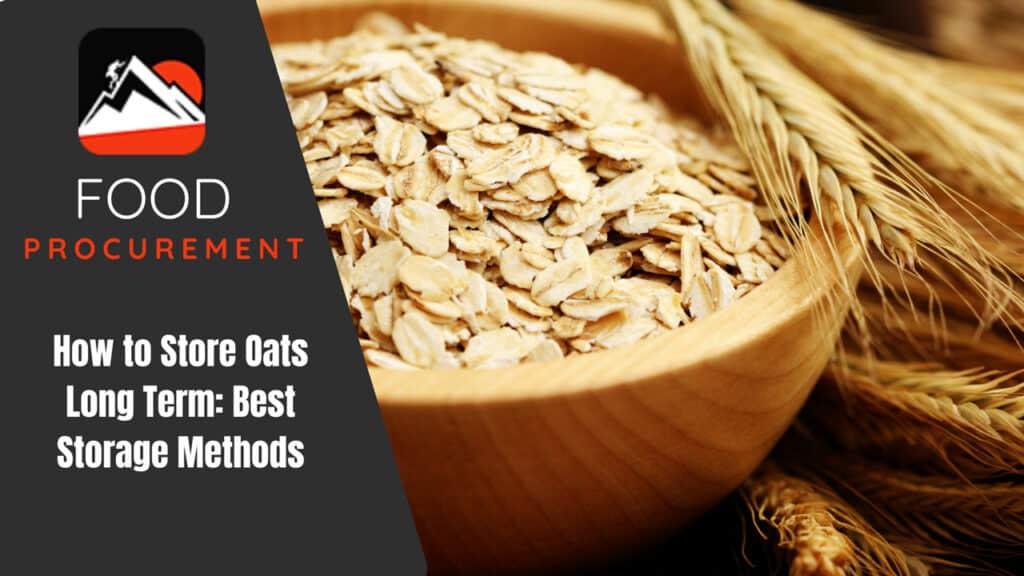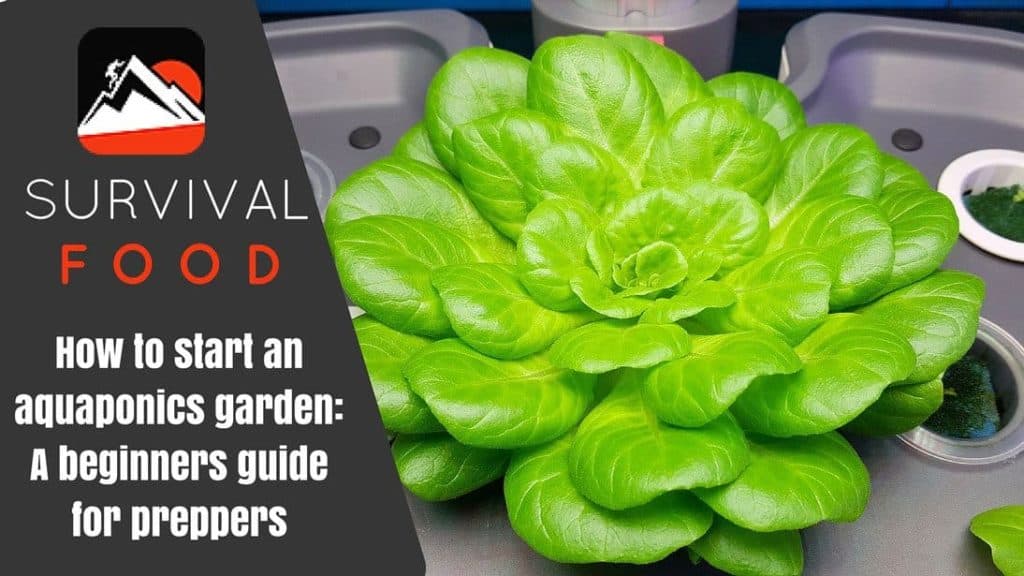Contents
Oats are one of the most versatile and healthy whole grains, but improper storage can cause them to spoil quickly. Long-term storage of oats requires some knowledge of the ingredients that can cause them to spoil, as well as how to eliminate these ingredients to extend the product’s shelf life. This article will provide you with information about how to store oats long-term as well as tips on how to keep them fresh. Click here to learn more about the long shelf life of foods for emergencies.
How Long Do Stored Oats Last?
Although oats are a long-lasting food, they have a shelf life. In addition, they must be properly stored to remain fresh. But if you store them incorrectly, their flavor will diminish or they may go rancid. So let’s see how long oats last:
1) 1-2 Years:
Rolled oats can last up to 2 years when stored in an airtight container in a cool, dry place. But then, if you store them in the fridge, they will last even longer.
2) 3-5 Years:
Oats that are stored in the freezer can last up to 5 years. When stored properly, they will retain their flavor and texture.
3) 6-8 Months
Quick oats have a shorter shelf life of 6-8 months and should be stored in a cool, dry place.
4) 3-4 Months
Steel-cut oats have the shortest shelf life (3-4 months) and should be stored in the fridge.
You might find also want to read our article about how to store pancake mix long term.
What Factors Determine How Long Oats Will Last?

Here are some of the main factors that determine how long oats will last:
1) Storage Conditions:
Oats should be kept cool and dry in an airtight container. If stored in humid or warm conditions, they will go bad more quickly. So instead, use an airtight container with a tightly fitting lid to keep the oats fresh for as long as possible. Also, look for a plastic storage box with hinges or latches for greater durability. Finally, try using Tupperware or Rubbermaid containers if you don’t have much space in your pantry.
2) Exposure to Light:
Oats exposed to light will spoil faster than those stored in the dark. Therefore, store your oats in a dark cupboard or pantry in order to extend their shelf life. However, if you must store them in a clear container, wrap the container in foil or place it in a dark bag.
3) Types of Oats:
Different types of oats have different shelf lives. For example, quick oats have the shortest shelf life, while steel-cut oats have the longest shelf life. So, choose the type of oats based on how long you need them to last.
4) Packaging:
Oats packaged in a vacuum-sealed bag will last longer than those in a cardboard box. When purchasing oats in bulk, look for those packaged in mylar bags with an oxygen absorber. These packaging options will extend the shelf life of your oats by retaining oxygen and moisture.
5) Date of Purchase:
The date of purchase is also a factor that determines how long oats will last. If you buy oats that have already expired, they will not last as long as those that are fresh. Therefore, always check the expiration date before purchasing oats to ensure that you get a fresh product.
The Types of Oats
1) Rolled Oats:
Rolled oats are the most common type of oat and can be found in most stores. They are made by steaming and rolling oat groats (the inner part of the oat kernel). This process makes rolled oats quicker to cook than other oats, but they also have a shorter shelf life.
2) Steel Cut Oats:
Steel-cut oats are made by chopping the oat groats into small pieces with a steel blade. This oat is less processed than rolled oats and has a chewy texture. As a result, they take longer to cook than rolled oats and have a longer shelf life.
3) Whole Oats Groats:
Whole oats groats are the least processed type of oat and have the longest shelf life. They are the inner part of the oat kernel and have a chewy texture. Because they are less processed, they take longer to cook than other oats.
4) Oat Flour:
Oat flour is made by grinding whole oats into a fine powder. It is suitable for baking but has a shorter shelf life than rolled oats. However, oat flour can be stored in the freezer to extend its shelf life.
5) Instant Oats:
Instant oats are pre-cooked and dried oats that have been processed to cook more quickly. As a result, they have a shorter shelf life than rolled oats and should be stored in the fridge.
6) Scottish Oats:
Scottish oats are a type of steel-cut oat that has been stone ground. They have a chewy texture and cook more slowly than rolled oats. However, Scottish oats can be cooked like rice and have a similar shelf life to steel-cut oats.
You might find interesting our guide about the proper way to store powdered milk for emergencies.
Are All Oats Types Processed?
No, not all oats are processed. In fact, if you’re searching for quick energy or fiber, whole oats are your go-to option. You can also find steel-cut or rolled oats at most grocery stores. These have been partially processed to remove a portion of their bran layer (the fibrous outer coating). The exception is that instant oatmeal is typically pre-cooked before it hits grocery store shelves. This means that, unlike hot breakfast cereal, they do not require water to be added to them when consumed (like hot breakfast cereal); simply add milk and stir.
Benefits Of Storing Oats for Emergencies:

There are many benefits to storing oats for emergencies. Here are just a few:
1) Long Shelf Life:
Oats have a long shelf life and can last for years when stored properly. It makes them an excellent option for those who want to stock up on food for an emergency.
2) High Nutritional Value:
Oats are a high-quality food packed with vitamins, minerals, and fiber. This makes them a nutritious option for those looking for emergency food.
3) Easy to Prepare:
Oats are easy to prepare and only require water to cook. This makes them a quick and easy option for those looking for a quick meal.
4) Versatile:
Oats can be used in a variety of recipes and are a versatile food, including oatmeal, granola bars, cookies, and more. They can be eaten for breakfast, lunch, or dinner.
5) Great In Natural Disaster Situations:
Oats are a great food to have on hand in case of a natural disaster. In addition, they can be used to make a hot meal, which can help warm you up in cold weather.
6) Good For Vegetarians and Vegans:
Oats are a good source of protein for vegetarians and vegans. Moreover, they can be used to make a variety of meals, including oatmeal, granola, and cookies.
The Best Oats for Long-Term Storage?
There are many types of oats that can be stored for long-term storage. Here are a few of the best options:
- Oat groats
- Steel-cut oats
- Regular oats
- Quick oats
Best Storage Methods for Oats
1) Freezing:
One of the best ways to store oats is by freezing them. This will help to extend their shelf life and keep them fresh. But then, to freeze oats, simply place them in a freezer-safe bag and store them in the freezer for up to six months.
Pros:
- Freezing helps to extend the shelf life of oats.
- It is a quick and easy way to store oats.
Cons:
- You will need to have a freezer available to store oats.
2) Vacuum Sealing:
Vacuum sealing is one of the best ways to keep oats fresh. When oats are vacuum-sealed, they are protected from oxygen and moisture. This keeps them from becoming hard or dry. Vacuum sealing also keeps out pests, such as moths and weevils, which can damage a stored supply of oats. As a result, vacuum sealing is an excellent method for storing oats for long-term use.
Pros:
- Vacuum sealing helps to keep oats fresh.
- It protects oats from oxygen, moisture, and pests.
Cons:
- The vacuum-sealed bags are not as tight as other food containers.
3) Food Storage Containers:
One of the best ways to store oats is in food storage containers. These containers are designed to keep food fresh and dry. They are also airtight and can be sealed to prevent pests from getting in. So, when choosing a food storage container, make sure it is made of durable materials and is the right size for your needs.
Pros:
- Less likely to become rancid and full of toxins.
- Keep oats fresh and taste great
- Prevent the oats from absorbing odors from other foods
Cons:
- The containers can take up a lot of space.
- You will need to have a place to store the containers.
5) Mylar Bags:
One of the best ways to ensure that your oats are fresh and nutritious is to store them in mylar bags. Mylar bags are made of a thin layer of plastic that helps keep oxygen and moisture out. This helps to keep your oats dry and prevents them from going bad. Additionally, mylar bags are resealable, so you can easily open and close them as needed. And because they’re lightweight and compact, mylar bags take up less space than traditional storage containers.
Pros
- They are resealable.
- Take up less space than traditional storage containers.
- Does not off-gas or release chemicals.
Cons:
- The bags are not as durable as some other storage methods.
6) Cans:
Oats are best stored in cans for long-term preservation. The airtight nature of the cans protects the oats from oxygen and moisture. They also keep out pests and help extend the oats’ shelf life. So, when choosing a can, select one made from food-grade materials and is the right size for your needs.
Pros:
- Cans are airtight and protect the oats from oxygen and moisture.
- They also keep out pests and help extend the oats’ shelf life.
Cons:
- The cans can take up a lot of space.
7) Mason Jars:
One of the easiest and most convenient ways to store oats is in mason jars. Mason jars are airtight and protect the oats from moisture, pests, and other contaminants. They are also easy to stack and can be stored in a cupboard or pantry. In addition, mason jars can be used to measure the correct amount of oats for a recipe. Simply fill the jar with the desired measurements and pour the content into a bowl or pot. This method is especially helpful when preparing oatmeal or porridge. The months-long shelf life of oats stored in mason jars makes them a convenient and affordable breakfast, lunch, or dinner option.
Pros
- It helps to keep the oats fresh and free from pests.
- Great way to portion out oats for individual meals.
- Mason jars can be reused for other purposes.
Cons:
- The jars can take up a lot of space.
What Can Spoil Oats When Stored Long Term?

1) Oxygen:
One of the main causes of spoilage in oats is oxygen. Oxygen can cause the oats to become rancid and full of toxins. It is important to store the oats in an airtight container to prevent this. This will help prevent oxygen from entering and extend the shelf life of the oats.
2) Moisture:
Another cause of spoilage in oats is moisture. Moisture can cause the oats to become moldy and full of toxins. So, to prevent this, it is important to store the oats in a dry place. For example, a food storage container or mylar bag can help keep the moisture out and extend the shelf life of the oats.
3) Temperature:
Temperature can also cause spoilage in oats. If the oats are stored in a too hot place, they can become rancid and full of toxins. Additionally, if the oats are stored in a too cold place, they can become hard and difficult to eat. So, the best way to store oats is in a cool, dry place.
4) Pests:
Pests can also cause spoilage in oats. For instance, mice, rats, and other pests can contaminate the oats with their waste, which can cause food poisoning. It is important to store the oats in an airtight container or mylar bag to prevent this. This will help keep the pests out and extend the shelf life of the oats.
5) Light:
Light can also cause spoilage in oats. For instance, light can cause the oats to become discolored and full of toxins. To prevent this, it is important to store the oats in a dark place. A food storage container or mylar bag can help keep the light out and extend the shelf life of the oats.
Signs That Tell You Oats Have Gone Bad:
- Rancid smell.
- Hard and difficult to consume.
- Discolored or full of toxins.
- Infested with pests.
- Moldy.
How Much Oats Should You Store For Emergencies?
The amount of oats you should store for emergencies depends on the size of your family and how often you eat oatmeal. A good rule of thumb is to store 1-2 pounds of oats per person per month. This will ensure that you have enough oats to last your family for a few months in case of an emergency.
Some Ideas To Use Your Stored Oats:
1) Baked Goods:
Oats can be used in a variety of baked goods. For example, they can be used as an ingredient in bread, cookies, muffins, and more. Click here to see the recipe.
2) Oatmeal:
Oatmeal is a healthy and filling breakfast option. Oats can be cooked in water or milk and can be flavored with honey, fruit, or spices. Click here to see the recipe.
3) Porridge:
Porridge is a type of oatmeal usually made with milk. However, you can add fruits, nuts, and spices to the porridge to make it more flavorful. Click here to see the recipe.
4) Granola:
Granola is a type of cereal made with oats, nuts, and dried fruit. It can be eaten as a cereal or used as a topping for yogurt or ice cream. Click here to see the recipe.
5) Trail Mix:
Trail mix is a snack consisting of nuts, seeds, dried fruit, and oats. It is a healthy and filling snack that can be eaten on the go. Click here to see the recipe.
6) Oat Milk:
Oat milk is a type of milk made with oats and water. It is a dairy-free alternative to cow’s milk and can be used in baking or as a drink. Click here to see the recipe.
7) Stews:
Stews are a type of soup that is usually made with meat, vegetables, and oats. Besides, oats can help thicken the stew and make it more filling. Click here to see the recipe.
8) Salad:
Oats can be used as a crunchy topping for salads. They can also be mixed into the salad for an extra dose of protein and fiber. Click here to see the recipe.
Extra Tips To Store Oats Long Term:
- Write the date of purchase on the storage container to know when the oats were stored.
- Inspect the oats every 6 months to make sure they are still fresh.
- If the oats have gone bad, discard them immediately. Do not try to salvage them.
- Use a food-grade storage container or mylar bag to store the oats. Do not use a garbage bag as this can lead to contamination.
- Store the oats in a cool, dark, and dry place. Do not store them in direct sunlight or near any heat source.
- Properly tag your oats with the date you packed them and the expiration date.
- You can store oats in the freezer for up to a year. Just make sure to thaw them before using them.
- If you are using a food storage container, make sure to leave some headspace. This will allow the oats to expand if they absorb moisture.
You may also be interested in How to store rice long-term!
Conclusion
Long-term oat storage is a great way to have a healthy, delicious breakfast option on hand all year round. By following the tips and storage methods in this guide, you can make sure that your oats are fresh and ready to eat when you need them. So, now that you know how to store oats long-term, it’s time to put your knowledge into practice! Click here to see our guide on how to store flour long-term. Once you have the basics down, start experimenting with different storage methods and tips to find what works best for you and your family. Then, with a little effort, you can ensure that your pantry is stocked with healthy, delicious oatmeal all year round.





